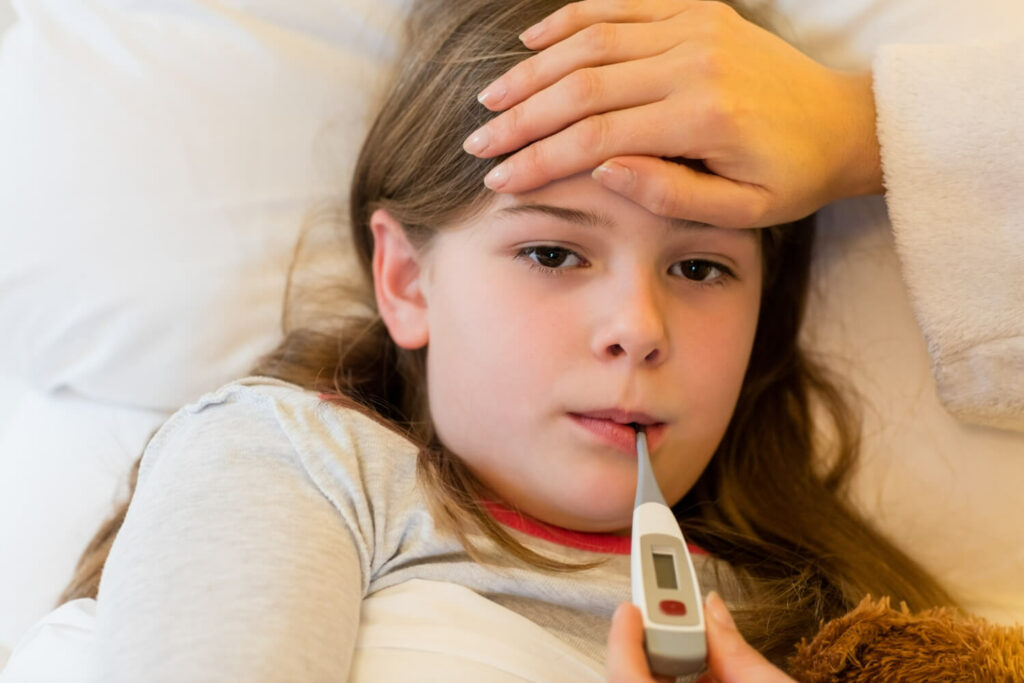Child Flu Treatment in Omaha, Nebraska
What to expect from Influenza in children
Influenza, more commonly known as “the flu,” is a respiratory virus that is highly contagious and is considered to be one of the more common and severe viruses to appear during cold and flu season.
Influenza is spread most frequently through coughing and sneezing. Since the influenza virus can live for a short time on surfaces, its ability to be spread is quite high. High-touch objects like light switches, doorknobs, countertops, and even pens and pencils can be prime sources of contagion. This is especially hard to manage for children who go to school. The influenza vaccination is highly recommended to protect the most vulnerable from severe illness.

Symptoms of Influenza
Influenza is often more intense than the average cold, but the two illnesses share similarities. Everyone may present a little differently, but the following symptoms are some of the more common signs of influenza:
- High fever
- Body aches
- Fatigue
- Cough
- Lowered appetite
- Headache
- Chills
- Nausea
- Vomiting
- Diarrhea
Flu vs. Cold
The flu and a cold can have similar symptoms, but there are a few stark differences between the two. Typically, symptoms of influenza come on quite abruptly and can be fairly incapacitating. The common cold often presents more gradually.
Sore throats and stuffy or runny noses can show up in both viruses, but are often more common with a cold.
Flu vs. COVID-19
To make matters even more confusing, we now have to consider the COVID-19 virus among our list of illnesses during cold and flu season. COVID-19 can present similarly to a cold or the flu. Some defining symptoms of COVID-19 could be:
- Shortness of breath or difficulty breathing
- Loss of taste or smell
If you’re concerned that your child’s illness is more than a cold, the best way to get answers is to schedule a COVID or flu test at the NHP&P clinic in Omaha, Nebraska.
Flu Treatment in Omaha
Typically a case of influenza does not require treatment other than over-the-counter symptom management, like pain-killers, fever reducers, cough suppressants, and decongestants. Some patients are at high risk for complications of influenza and may benefit from the antiviral medication, Tamiflu. Antiviral medications are not like antibiotics. They have been known to reduce symptoms and shorten the time of illness, while decreasing the risk of complications, such as bacterial pneumonia.
Our Omaha clinic offers flu tests that will help us determine whether or not antiviral treatment is appropriate for you or your child.

How do you prevent Influenza?
Though it can be difficult to avoid, you can take steps toward flu prevention for you and your family. To lessen your chances of getting the flu, we recommend:
- Cover your nose or mouth when sneezing or coughing
- Clean your hands with warm water and soap regularly
- Use hand sanitizer if hand-washing isn’t an option
- Clean and disinfect home surfaces
- Avoid touching your mouth, eyes, or nose
- Stay home if you are sick or have symptoms
- Get an annual flu shot
Who should get a flu shot in Omaha?
The influenza vaccine has been around for decades and continues to be one of the most effective methods of flu prevention. At Nebraska Home Pediatrics & Parents, we recommend that anyone over 6 months of age without adverse conditions get a flu shot. We also recommend scheduling your flu shots by Halloween in order to get the maximum amount of protection from the vaccine.
There are certain cases in which people may not be eligible to receive a flu shot, including:
- Infants under 6 months of age
- People with known vaccine allergies or past reactions
- People who have had Guillain-Barré Syndrome
Ready to schedule your flu shot? Have questions about influenza or the vaccine?
Call us today for a same-day appointment or to speak with a professional who can help you get the answers you need.